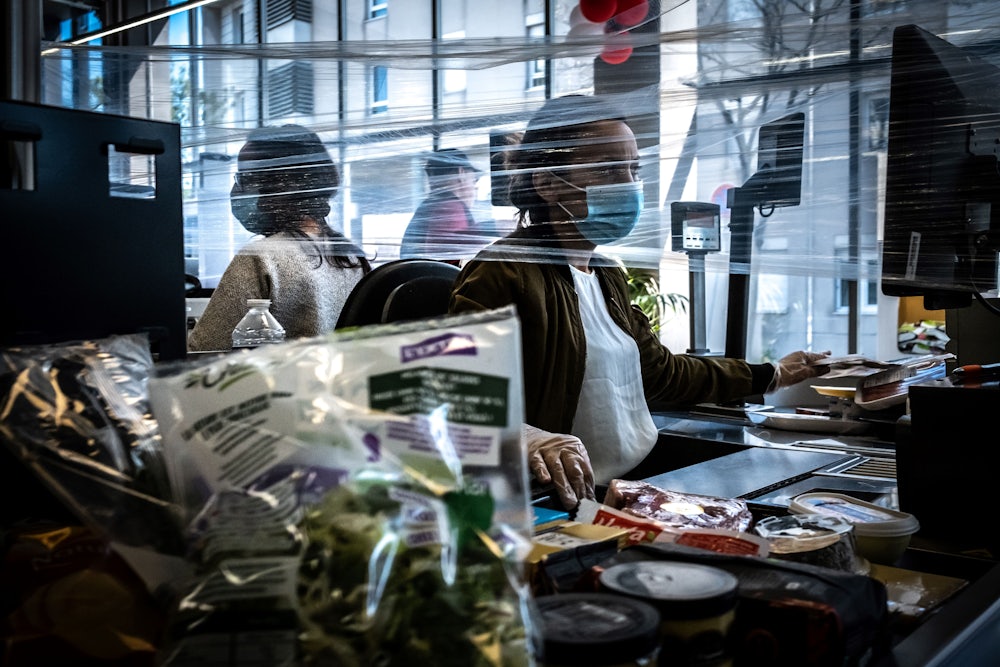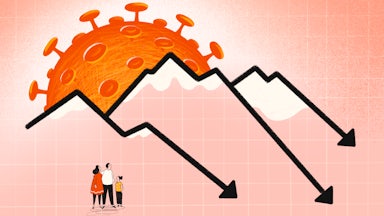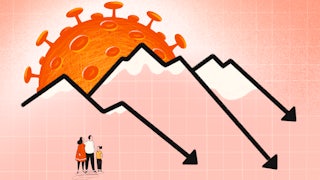A few weeks ago at work, a man came in the door, crouched down, and shit on the floor. Colleagues who witnessed it happening were shocked but not surprised. This kind of thing—incidents having to do with the universal human needs to eat, empty bowels, and keep bodies warm—happen often enough at the grocery store where I work.
People living at the encampment a few blocks away often come into the store to shop, steal, thaw out frozen limbs, or relieve themselves. Store bathrooms are accessible with a code that is only given out to paying customers—a policy that has resulted in unhoused people, or really anyone who doesn’t have money, waiting outside the door so they can grab it when someone exits. I’m guessing what happened with the man who dropped his pants had something to do with that informal system—maybe no one opened the door from the inside in time.
The episode caused a split inside the store, a divide between those who thought of it as a personal affront and those who thought of it as an unfortunate consequence of circumstances outside of the man’s control. When my colleague, a security guard, told me about it, I told him, “Everyone has to shit somewhere.” It was my way of defending the man. My co-worker shook his head. “Jane had to clean it up,” he replied.
He was drawing a line between us and the man; it also occurred to me that his response was a kind of solidarity that applied only to those of us working in the store. Cleaning up feces was not part of Jane’s official duties, and since most of us have boring, dirty, low-wage jobs, protecting ourselves from added labor is a high priority. We had to be united against that kind of thing, and in my colleague’s version of what happened, the unhoused man was on the wrong side of the divide because he had made our lives even more miserable and degrading that morning.
Low-wage workers are far from the only people who draw lines between ourselves and those we regard as dangerous. There’s a genre of writing that’s developed in parallel to the pandemic, call it the Covid explainer, that basically performs the same function. Last November, The New York Times’ Tara Parker-Pope published a piece called “How Do I Make Thanksgiving Shopping Safer?” It was full of helpful advice for customers who wanted to enjoy a Thanksgiving meal but who were worried about catching Covid-19 while buying turkeys, sweet potatoes, and cranberry sauce. The reporter recommended going to the store during nonpeak hours—forget Saturday afternoons—wearing a good mask, frequent hand sanitizing, and getting in and out quickly.
The article was similar to one that appeared a couple of months later after a new, more contagious strain of the virus had started spreading. In Vox, Julia Belluz published “Still Going to the Grocery Store? With New Virus Variants Spreading, It’s Probably Time to Stop.” In the piece, the reporter described new dangers to shoppers and recommended some precautions:
If we want the pandemic to end as fast as possible, we need to pump the brakes right now … that means avoiding optional gatherings with other people–even grocery trips.… “Shopping for five minutes in the grocery store is a lot better—six times better—than shopping for 30 minutes,” said Tom Frieden, the former director of the Centers for Disease Control and Prevention.
I know that pieces like this serve a real purpose, but all I could think about while reading these articles was: What about those of us who work in grocery stores? We can’t spend less time indoors or limit our gatherings with large numbers of people because those are the activities that we are (poorly) paid to do. If we didn’t do them, there wouldn’t be grocery stores for Times and Vox readers to worry about going to. But I don’t think we’re part of the presumed readership of publications like these: affluent, likely white-collar with a newly remote job; staying home because they can afford to; the kind of person who encounters service workers but does not do service work and can’t imagine that they ever will.
In addition to exhibiting a class blindness which forgets that grocery stores have to be run by someone, some media reports on the pandemic have veered into describing a world where working-class people don’t even exist. Vox advised readers to “pick up groceries at the curbside” instead of going into the store, as if the desired items just assemble themselves.
The Times reporter’s way of disappearing low-wage employees from a scenario that actually features them was even more striking. “Some stores,” she wrote, “sanitize the carts several times a day as part of their regular cleaning procedures.” This is correct. At my workplace, shopping carts are sanitized after each use. However, they are not sanitized by the “store,” but by people who are paid between $10 and $12 per hour to do so.
My point in all of this is that while everyone needs access to grocery stores, especially during a pandemic, some people have to work in them, and some people don’t; some can afford the goods inside, and those who can’t sometimes rely on stores having accessible restrooms. Grappling with this fact may be key to building a more equal world, one in which solidarity doesn’t end at the grocery store door or with Vox advice columns. Creating such a world would mean not just acknowledging that such differences exist but ending them.
A good percentage of customers at my store know that my colleagues and I are doing a dangerous job that they are grateful not to have to do themselves. Some even take time to say thanks. But gratitude is not the same as solidarity. In fact, it may be its opposite. Gratitude allows a profoundly unequal situation to continue as long as its beneficiaries are nice about it.
Not everyone who shops at my store is nice, though, and some aren’t even grateful. These days, my colleagues and I are just as likely to be treated as vectors of disease as treated as essential workers. From my place behind a checkstand, I have regularly observed customers whose nervousness emanates from across the room. Some shoppers stiffen up as they approach a checkout lane, as if they are preparing to enter the gauntlet: physical nearness to a working-class person who has probably spent all day next to other working-class people.
One customer even sniped at a bagger, an 80-year-old woman who was working my line. “Stop touching my groceries!” he yelled. When she walked away in frustration, he turned to me and said, “We’re in the middle of a pandemic,” as if I needed to be reminded. I don’t think it would have helped to inform him that, before a customer purchases a grocery item, it has already been touched by multiple people, including those who work in my store between 10 p.m. and 6 a.m. unloading trucks and stocking shelves. For people like him, in that moment, the world is already divided up neatly and correctly into people who have to work at grocery stores and people who don’t. These days, his main goal is avoiding contagion during the brief moments when he shares a space with us.
In some ways, I don’t really blame him for that. There is no way to social distance in a grocery store. My colleagues and I are frequently and unavoidably in close contact with each other and with our customers. A recent study by the Journal of Occupational and Environmental Medicine summarized the toll at one store in Boston. “One in five (21 out of 104) workers tested positive for SARS-CoV-2, indicating a prevalence of 20 percent at that point in time,” the study authors wrote. “This was significantly higher than the prevalence of the infection in the local community at the time.” Shoppers are not wrong to fear that my colleagues and I are infected. We are a danger to our customers, and they are a danger to us.
Higher rates of disease are one reason media outlets are offering advice about how to stay safe in grocery stores. For our part, my colleagues and I express solidarity with each other in another way: We try not to stress each other out. This is more important than it may seem. One day, I was working a few feet away from a college student named Madison. She approached me, her hot pink mask pulled tightly around her face, and said that she had just received a call: Her recent rapid Covid-19 test had come back positive. “Go home,” I said and waved her off. How many minutes had I and others spent in her presence? I wasn’t sure. Had Madison suspected that she was sick? If so, why didn’t she stay home?
My annoyance at Madison didn’t last. Her approach to working during a pandemic is widespread in our store. Until actually contracting the virus, my colleagues and I just keep going about our duties. There is no reason to get all worked up about what might happen until it does, especially since everyone in our store—customers and employees—is required to wear a mask, and all staff members have been provided with hand sanitizer and access to a handwashing station.
Still, policies about sick leave and when someone might qualify for it are not always clear. When Madison returned to work a few days later, I asked a manager about her status. “Has she tested negative?” The manager just shrugged. The process by which she had moved from a positive test back into her checkstand was mostly a mystery. But it hardly mattered. The Christmas season was upon us, and we were being overrun with holiday shoppers.
Laughter is another coping mechanism that doubles as a kind of solidarity. Our capacity to infect each other has become a running joke. During the night shift, employees organize themselves into groups to get rides home. (Most of us don’t have cars. We can’t afford them.) People begin asking: “Who has a car tonight?” The word gets around. “Bobby is dropping me off tonight,” I said to my colleague Katherine one evening. “You should ask him if he has room for you, too.” By closing time, Bobby had a full car of grocery store workers newly released from their jobs. I rode in the front, and three others squeezed into the back. “We’re all getting Covid tonight!” Bobby announced as he started the engine. We all laughed.
This type of solidarity occurs because the store provides an institutional framework that makes it possible. As the defecation incident revealed, though, the sense of togetherness doesn’t apply beyond our workplace. Collective coping mechanisms do not contain the seeds of a broader political awakening. One reason is that most people are totally consumed by the necessity of earning enough money to pay the bills. It can make the world feel very small. Another, at least in my store, is that my colleagues and I are surrounded by desperation and a need that surpasses our own, and that presents us with a vision of social collapse that we are more interested in keeping at a distance than in connecting to our own lives. This is a type of social distancing that has been occurring since long before the onset of the pandemic.
We create this distance in other ways: In addition to serving customers, one of the things that employees at my store do is help catch thieves—and there are a lot of them to catch. The reason for a recent spike in theft at grocery stores is not hard to discern. The Census Bureau recently reported that as many as one in six adults in the United States do not get enough to eat on a regular basis.
As one response to a mass hunger crisis, security guards at my store sit on a balcony above the main shopping concourse where they scout for thieves. Scuffles between guards and people trying to leave without paying—stuffing dinner rolls into their pockets or candy bars into their purse—are a regular occurrence. Many of my colleagues willingly participate in the chase. This feels to me like another way our solidarity is tested, and limited.
Part of it is coercive—catching shoplifters makes us seem like better employees. But I don’t think that can explain all of it. Many of us are one or two missed paychecks away from having to pilfer groceries ourselves, but among my colleagues, a widely held view about those who steal still goes something like this: “I work this terrible grocery store job. And anyone else could do that, too, if they wanted to make an honest living.” From the point of view of the not-quite-destitute, food thieves don’t deserve solidarity.
The question of solidarity and who is privileged enough to be able to express it is a theme of one of the most well-known American short stories ever written—one that just happens to take place in a grocery store. John Updike’s 1961 “A&P” is narrated by Sammy, a cashier in a store north of Boston. The tale takes place in the summer, when three young girls walk into Sammy’s workplace. Wearing nothing but their bathing suits, they attract a lot of attention. The 19-year-old is transfixed. “All three of them stopped in the cat-and-dog-food-breakfast-cereal-macaroni-rice-raisins-seasonings-spreads-spaghetti-soft-drinks-crackers-and-cookies aisle,” Sammy says. “I watched them all the way.” By the time the girls reach Sammy’s checkout stand with snacks, the manager has noticed the trio, too. He comes over and loudly declares that they are indecently dressed, which is against store policy. Everyone in the store is gaping at the girls now. Sammy is appalled at his manager’s attitude. “Policy is what the kingpins want,” he thinks to himself.
As soon as the girls leave, Sammy confronts his manager: “You didn’t have to embarrass them,” he says. The boss snorts, “It is they who were embarrassing us.” In an act that is equal parts youthful bravado and solidarity with the girls who have already disappeared from the scene, Sammy quits on the spot. He leaves the store with his former manager’s dark warning ringing in his ears: “You’ll feel this for the rest of your life.” Once outside, Sammy turns to see the man who uttered those words behind the register “checking the sheep through.”
I have come to think of Sammy’s decision to walk away from his grocery store job as a method of protecting himself from the grimy feeling of being implicated in an injustice. He knew that saying “I quit” in that moment was one of the last times he would be able to risk his own livelihood to speak up for someone else. As adulthood and the need to make his own way in the world loomed, Sammy would not be able to afford to be in solidarity with just anyone—especially not with three strangers that he would never see again.
For my colleagues and I, no such solidaristic “I quit” moment is available. What is available is chasing down shoplifters—an act that at least breaks up the tedium of our jobs and makes us feel like the good guys. Our solidaristic instinct is not shaped by an understanding that we have more in common with grocery store thieves than with the corporate owners who want us to stop them. It is shaped, instead, by the more tenuous and insular hope that the next workday might not be as long and boring as the last and that maybe, if we’re lucky, none of us will have to clean up shit.
Our version of solidarity, of wanting everyone with whom we work to suffer a little less on the job, requires regarding food thieves and unhoused people as potential threats.
But I can picture something different, though a lot would have to change first. We need to think and act collectively to fight for new social policies that would make new, more expansive forms of solidarity possible. But such an effort is hampered by the world we already have, in which looking out for yourself, your family, and the person working next to you in the grocery store is the best most of us can do. It’s what we have been taught all our lives.
The sort of changes necessary here are vast, but I want to add something to the discussion about what policies would help address economic inequality in the U.S., Medicare for All, a federal jobs guarantee, and mass debt relief among them. To those good ideas, I want to add another: a real redistribution of labor. What if people who don’t normally work in grocery stores had to pull a few shifts in order for us to have grocery stores? I’m not talking about everyone in the neighborhood picking up a weekly shift at the local food co-op. I’m talking about a much more fundamental change.
David Graeber introduced us to the concept of bullshit jobs, those “pointless” roles that capitalism produces for the sole purpose of “keeping us all working.” For him, the ruling class has convinced us that “anyone not willing to submit themselves to some kind of intense work discipline for most of their waking hours deserves nothing.” Graeber’s proposal is that we get rid of the useless jobs so that everyone is free to work less and enjoy their lives.
While not disagreeing with his broad point, I do wonder if “submitting themselves to some kind of intense work discipline” might actually be a good thing for some people, specifically those “salaried professionals” who Graeber names as having benefited from the bullshit jobs regime. Maybe a key to ensuring that all jobs are less horrible and better paid is not so much in separating the pointless from the essential but in making sure that “corporate lawyers,” “financiers,” “lobbyists,” and the like have to finally spend some time doing the ones that count.
Instead of eliminating bullshit jobs, what if we focused on an upward redistribution of the shit jobs so that millions of people who have been doing them forever can finally take a break?
Think about the social policies that might suddenly find more widespread support if such a system of labor redistribution were implemented. How many more affluent people would be in favor of doing whatever was necessary to end homelessness if they had to clean up the messes that arise from the problem of not having access to a bathroom?
I propose that a key to social change that lasts is assuring that, if there is shit to clean up, those who have contributed so little for so long are the first to be handed a dustpan and a mop. That’s solidarity.
This piece was supported by the Economic Hardship Reporting Project.








